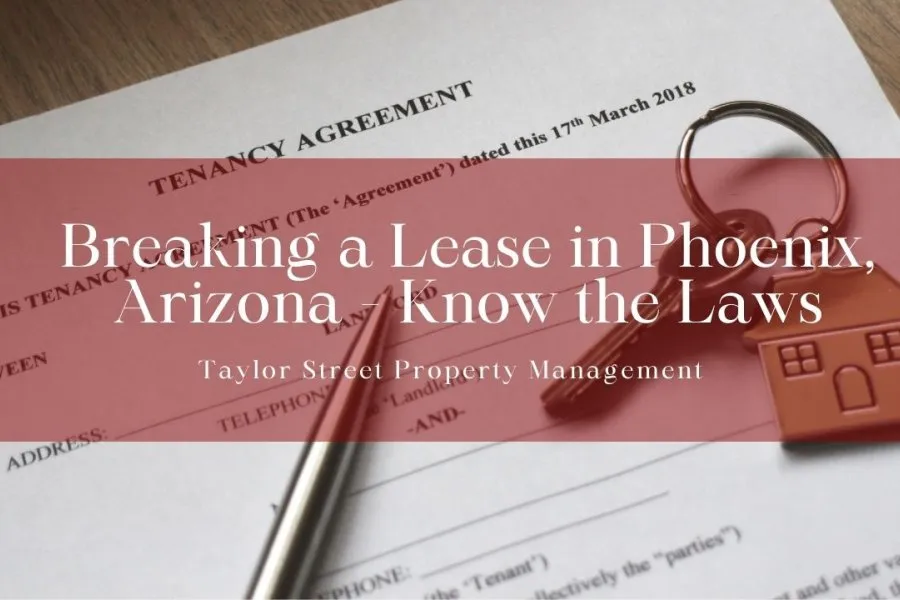A lease is a contractual agreement between the landlord and the tenant. Tenants who sign a lease agreement, also known as a rental agreement, normally intend to stay until it expires. Sadly, this isn’t always the case.
A tenant may need to move due to a job transfer, a divorce, or even a military deployment. Whatever the reason, though, breaking a lease is a serious violation and as a landlord, you may be able to recoup your losses by penalizing the tenant. But whether or not to penalize a tenant depends on their reason for breaking a lease.
This article will cover everything landlords need to know about breaking a lease in Arizona.
Legal Reasons for Breaking a Lease in Arizona
A tenant may be able to legally break their lease. This means that a landlord cannot penalize them for doing so. The following are the legally justified reasons for lease-breaking in the state of Arizona:
Early Termination Clause
Modern lease agreements usually contain an early termination clause. An early termination clause provides specific terms that a tenant must meet in order to be released from the agreement.
Normally, a tenant must meet two requirements to qualify for the early lease termination:
- The tenant must be able to pay the landlord a fee. This is usually the equivalent of the rent of two months.
- The tenant must provide the landlord with proper notice. The notice helps the landlord prepare themselves for re-renting the unit.

Active Military Duty
Has your Arizona tenant received deployment orders from their commanding officer stating their pending deployment? If so, then they are protected by the Servicemembers Civil Relief Act (SCRA).
The protection starts from the day they begin active duty and ends between 30 and 90 days later after being discharged. A tenant must however meet certain criteria before being allowed to break their lease.
Tenants must show their Arizona landlords proof that they intend to be on active duty for a minimum of ninety days. They must also show proof that they signed the lease prior to beginning active duty.
In Arizona, servicemembers are members of the:
- Armed Forces
- Activated National Guard
- Commissioned corps of the Public Health Service
- Commissioned corps of the National Oceanic and Atmospheric Administration
But even with all requirements met, a tenant must wait 30 days until the next rent period begins for their lease to terminate.
Privacy Violation
A landlord needs to respect their tenants right to live in a quiet and peaceful rental unit. Be that as it may, you also have a right, as the landlord, to enter their premises under the Arizona landlord-tenant laws.
A landlord may need to enter the tenant’s home:
- In the case of an emergency.
- If the tenant gives them permission to enter.
- Under a court order.
- To show the unit to prospective tenants, or lenders.
- To inspect the unit per the lease agreement.
- In case of property abandonment.

In all these cases, a landlord must provide their tenant with written notice prior to accessing their rented units. The only exceptions to this are in cases of emergencies and property abandonment.
You, the landlord, must provide your tenant with said written notice at least 2 days prior to entry. The entry times, although not specified, must also be reasonable.
Landlord Harassment
Landlord harassment is when the landlord creates conditions meant to encourage a tenant to break their lease/ rental agreement. Landlord harassement can take on different forms. Besides illegal entry, the following examples of landlord harassment include but are not limited to:
- Refusing to accept a rent payment.
- Threatening the tenant.
- Removing their belongings from the property.
- Refusing to make required or requested repairs.
- Shutting off the tenant’s utilities.
- Changing the locks
If the landlords action are serious, it may be enough justification for a tenant to end their lease/ rental agreement.
Domestic Violence
Arizona tenants may also be able to break their lease legally if they have been victims of domestic violence. The tenant must follow the proper procedure before moving out.
According to Arizona state laws, you, the landlord have a right to verify your tenant’s claim of Domestic Violence status. Once this proof is provided, the tenant may break their rental agreement without penalty.
A landlord must also change the locks if a domestic violence victim requests them to do so. The cost of doing so is the tenant’s to bear.
Unit is Uninhabitable
Every state, including Arizona, has specific health and safety codes that every rental property must abide by. A landlord in Arizona has a responsibility to provide a fit and habitable rental property.

he following are some of the habitability standards that a rental unit must meet:
- Conformity to building codes.
- Reasonable protection from criminal intrusion.
- Sanitary premises, including preventing rodent or insect infestation.
- A functioning toilet or bathroom.
- Functioning smoke and carbon monoxide detectors.
- Adequate heat during the cold weather.
- Safe drinking water.
Insufficient Legal Reasons to Break a Lease in Arizona
The following reasons don’t generally offer enough justification to release a tenant from the terms and conditions of the lease agreement:
- The tenant is moving into the new home they bought.
- The tenant is relocating to a new school or job.
- They are downgrading or upsizing.
- The tenant is moving in with a partner.
- The tenant is moving to get closer to their family.
Regardless of the reason for breaking a lease, however, an Arizona landlord is duty-bound to find a replacement tenant.
Summary
There are legally justifiable reasons for a tenant to break a lease/ rental agreement and it’s important as a landlord to understand them. It’s also important to remain informed of Arizona state law, federal law, and other rental laws pertaining to security deposits, the legal eviction process, and squatter’s rights.
If you would like help keeping track of all these laws or would like assistance managing your properties, contact the experts at Taylor Street Property Management today!
Disclaimer: This blog is only meant to be educational and is in no way a substitute for professional legal advice. For expert advice, kindly hire a qualified attorney or an experienced property management company.


